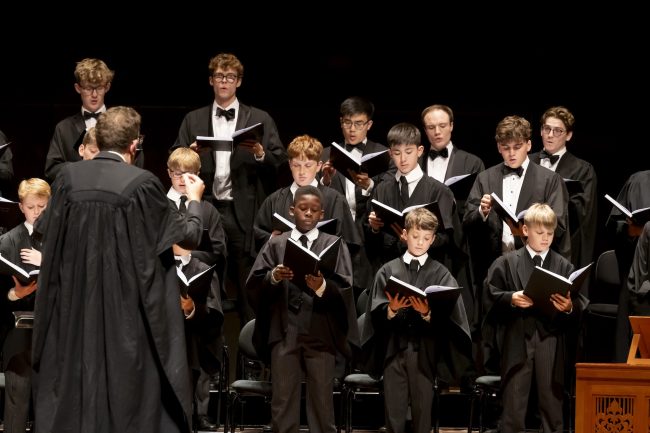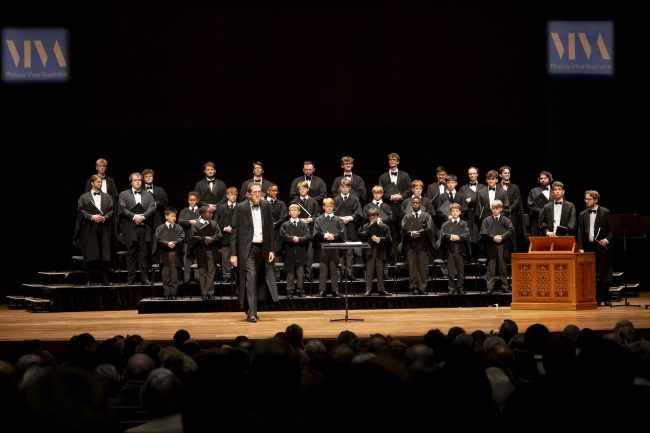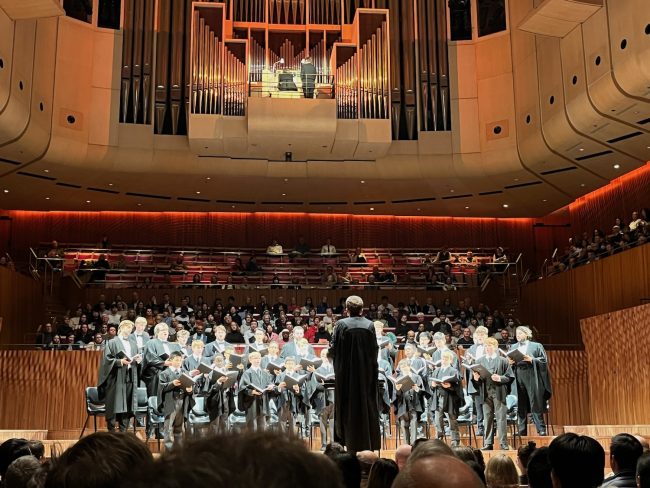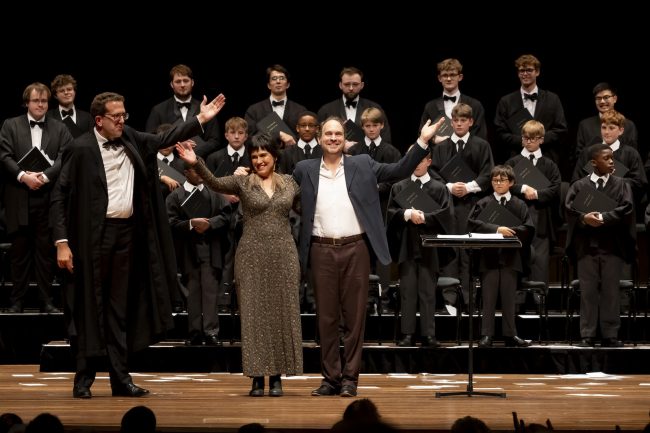Monday 29 July 2024
King’s College Choir, Cambridge
Review by Paul Neeson (Arts Wednesday)

I feel conflicted. When I look at the stage I see a couple of the boys fidgeting (they caught my eye because the rest of the choir were still, focused and disciplined). Fidgeting with their gowns, their hands, and whatever boys of that age fidget with. Even so, the whole time they had their eyes intently glued on the Director. I also see young men with varying degrees of success growing facial hair, but I also see growing confidence and certainty in their talent and career choice. But when I close my eyes I hear a world class professional troupe of music makers. Age has suddenly been rendered irrelevant. I decide to keep my eyes closed and let myself be subsumed by the acoustic bliss being presented by the King’s College Choir, Cambridge to a packed Concert Hall of the Sydney Opera House.

And what better way to shake off any butterflies than Handel’s boisterous coronation anthem, Zadok the Priest. though I’ve never been quite sure why an anthem to crown a British Monarch references the religious hierarchy of ancient Israel. I’m sure a more learned musicologist could inform me. Then Gabrieli’s O magnum mysterium confirmed that we were in for a wonderful performance from such a talented choir under the direction of Daniel Hyde.
Morten Lauridsen’s version of O magnum mysterium was the highlight of the evening, with its ever-shifting harmonies perfectly controlled and weighted, the end of each phrase drifting effortlessly and exquisitely into the far corners of the Concert Hall. I know it is a cliche, but we really believed we were listening to the voices of angels.

But why sandwich it in between two works for solo organ by Olivier Messiaen? When you have the mighty Sydney Opera House organ at your disposal how could you resist, and no-one does drama like Messiaen. Organist Harrison Cole managed to rattle the very foundations of the hall with the thunderous rendition of L’Ascension, which after an assault of mashed chords and powerful melodies on the pedal, curiously resolved onto a major chord, reflecting Messiaen’s conviction in the resurrection. In the end it was the drama either side of the Lauridsen that accentuated its sublime peace. Nothing is so powerful as contrast.
While Edgar Bainton’s And I Saw a New Heaven is a pleasant work, I can see why history has largely ignored him as a composer. In 1928 he was writing in a style that was already anachronistic, as modernism was taking a firm hold on the music world.

We ended the first half with a commission by Musica Viva: Charlotte by Damien Barbeler on a poem by Judith Nangala Crispin. It began by painting a bucolic scene in what seemed to be paradise. The bass (falsetto) and soprano soloists made me think I was hearing currawongs calling and responding across the valley. (I do spend a lot of time listening to birdsong in the bush) But then it goes on to tell a dark tale of what we would call these days the Frontier Wars, describing massacre, disenfranchisement and destruction of culture. A challenging work, and I can only begin to imagine how young teenage minds given the task of responding emotionally would cope with these dark images. I suspect for some it was not easy, as this highly disciplined choir with faultless pitch strayed off key on the repeated line “Chartlotte is a map of Country stained by massacre.” The performance was moving and convincing nonetheless.
After the interval we were treated with what we were told is a regular piece in the Choir’s repertoire, the Durufle Requiem. It was performed without break between movements as it would be in a church service, the delicate organ accompaniment bridging the sections into a satisfying whole. And after the final In Paradisum, the audience expressed their appreciation, enough to elicit an encore.